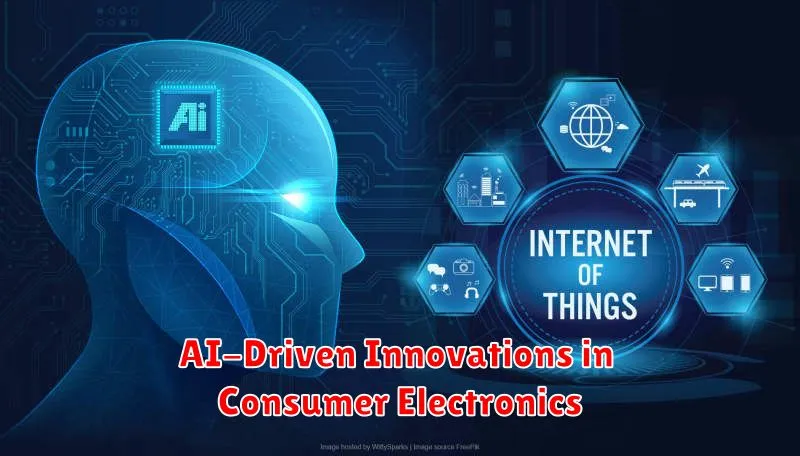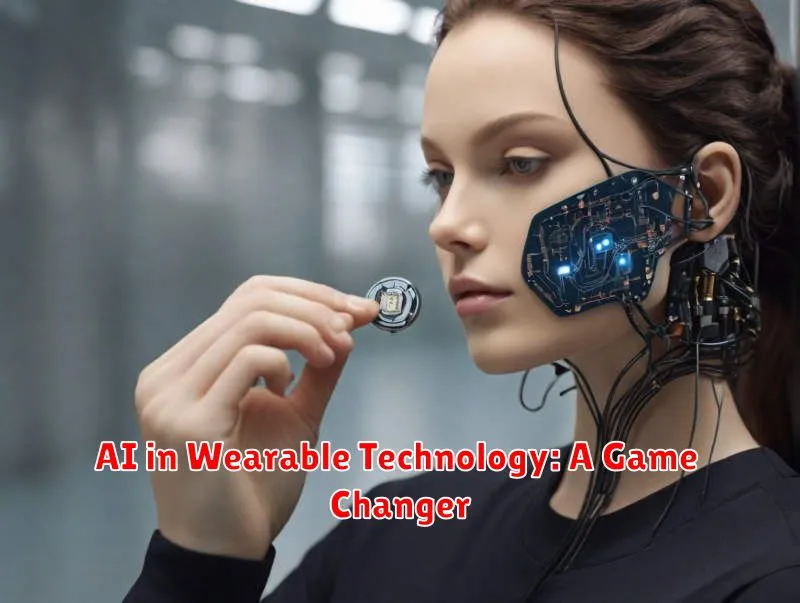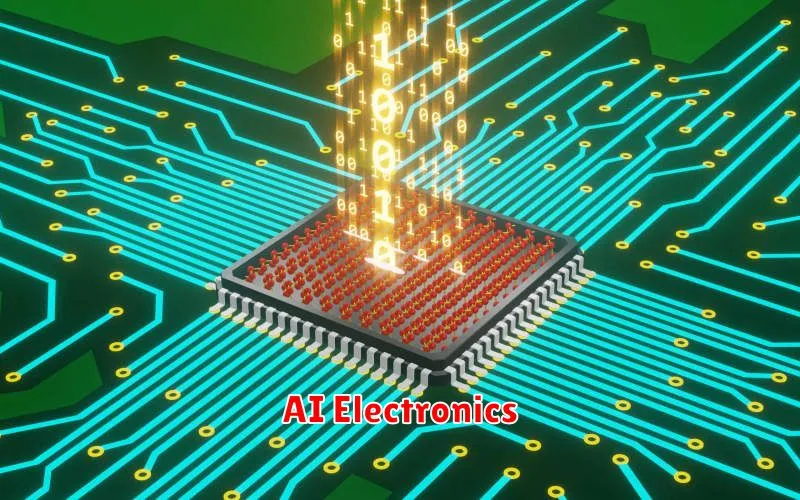The world of consumer electronics is rapidly evolving, and artificial intelligence (AI) is at the forefront of this transformation. From smart home devices to virtual assistants, AI is revolutionizing the way we interact with our technology and shaping the future of how we live, work, and play. With its ability to learn, adapt, and make decisions based on data, AI is driving innovation across various consumer electronics segments, leading to devices that are more intuitive, personalized, and powerful than ever before.
This article delves into the transformative impact of AI on consumer electronics, exploring the key trends, technologies, and applications that are shaping the industry. We will examine how AI is enhancing user experiences, driving efficiency, and creating new opportunities for both consumers and manufacturers. From voice assistants that understand our needs to smart TVs that personalize our entertainment, the future of consumer electronics is being powered by the intelligence of machines.
AI-Driven Innovations in Consumer Electronics

Artificial intelligence (AI) is rapidly transforming the consumer electronics industry, driving innovation and creating new possibilities for consumers. From smart home devices to wearables and entertainment systems, AI is enhancing our daily lives in countless ways.
Personalized experiences are one of the most notable advancements driven by AI. AI algorithms analyze user data and preferences to tailor device settings, content recommendations, and even physical interactions. For example, smart speakers can learn your voice and music tastes, while streaming services can suggest movies based on your viewing history.
AI is also empowering voice assistants to become more sophisticated and intuitive. Devices like Amazon Alexa and Google Assistant can now understand natural language, respond to complex queries, and even proactively offer assistance based on context. These capabilities are transforming the way we interact with our devices and access information.
In the realm of smart homes, AI is driving the development of interconnected devices that automate tasks and improve energy efficiency. Smart thermostats, lighting systems, and security cameras can all be controlled and monitored through AI-powered platforms, creating a seamless and personalized living experience.
Beyond convenience, AI is also playing a vital role in improving health and wellness. Wearable fitness trackers, smart watches, and health monitoring devices use AI to analyze data, provide personalized insights, and even detect potential health issues. This technology empowers users to take control of their well-being and make informed decisions about their health.
The future of consumer electronics is undoubtedly shaped by AI. As the technology continues to evolve, we can expect even more transformative innovations that will redefine our relationship with technology and enhance our everyday lives.
The Role of AI in Personalized User Experience
AI is revolutionizing consumer electronics by enabling personalized user experiences. AI-powered devices can learn your preferences, habits, and needs, and tailor their functionality to meet your individual requirements. This is achieved through various techniques like machine learning algorithms, which analyze your interactions with the device and predict your future needs. For example, a smart home system can automatically adjust temperature and lighting based on your daily routines, or a music streaming service can suggest songs based on your listening history.
Furthermore, AI-driven virtual assistants provide personalized support, answering questions, setting reminders, and even making recommendations. These assistants constantly learn and adapt to your individual preferences, providing a more intuitive and efficient experience. As AI technology advances, we can expect even more sophisticated personalized experiences, transforming the way we interact with our consumer electronics.
How AI is Changing the Way We Use Electronics
Artificial intelligence (AI) is rapidly transforming the way we interact with our electronics. From smartphones to smart home devices, AI is enhancing our experiences and making our lives easier. AI-powered features are now commonplace, including voice assistants, personalized recommendations, and predictive maintenance.
One of the most significant impacts of AI on consumer electronics is the rise of voice assistants. Devices like Amazon Alexa and Google Assistant have become integral to our daily routines, allowing us to control our homes, access information, and manage tasks with just our voice.
AI is also revolutionizing how we use our smartphones. AI-powered apps are capable of learning our habits and preferences, providing personalized recommendations for music, movies, and even food. AI also enhances camera capabilities, offering features like automatic scene recognition and object detection.
In the realm of smart home devices, AI is driving innovation. AI-powered thermostats, security systems, and lighting systems are becoming increasingly sophisticated, learning our preferences and automating tasks for increased convenience and efficiency.
AI is also playing a crucial role in predictive maintenance. By analyzing data from sensors and usage patterns, AI can predict potential malfunctions and alert users before they occur, minimizing downtime and extending the lifespan of our devices.
As AI technology continues to evolve, we can expect even more transformative changes in the way we use electronics. From personalized healthcare solutions to AI-powered transportation systems, the possibilities are limitless. AI is not just changing the way we use electronics; it is shaping the future of our digital lives.
AI in Wearable Technology: A Game Changer

The intersection of artificial intelligence (AI) and wearable technology is revolutionizing the consumer electronics landscape. AI-powered wearables are transforming how we interact with the world, enhancing our health, fitness, and overall well-being.
One of the most significant impacts of AI on wearable technology is in the realm of personalized health monitoring. Smartwatches and fitness trackers equipped with AI can analyze data from various sensors, including heart rate, sleep patterns, and activity levels. This allows for more accurate and personalized health insights, enabling individuals to proactively manage their well-being.
Furthermore, AI is enabling smarter and more intuitive user experiences. Wearable devices can learn user preferences and habits, providing personalized recommendations and adjusting settings accordingly. This includes things like suggesting workout routines based on fitness goals, recommending music based on mood, and even automatically adjusting device brightness based on ambient lighting.
Beyond health and fitness, AI is also empowering wearables to become powerful tools for communication and productivity. Voice assistants integrated into smartwatches and earbuds allow users to make calls, send messages, and control smart home devices hands-free. AI-powered translation features can facilitate communication across language barriers, making wearables invaluable tools for travelers and international businesses.
The integration of AI into wearable technology is just beginning. As AI algorithms continue to evolve and become more sophisticated, we can expect even more groundbreaking innovations in the future. From personalized health management to enhanced communication and entertainment, AI-powered wearables are poised to transform our lives in profound ways.
Future Trends in AI-Driven Electronics
Artificial intelligence (AI) is rapidly transforming the consumer electronics landscape, driving innovation and shaping the future of how we interact with our devices. From smart homes to personalized entertainment, AI is playing an increasingly central role in enhancing our everyday lives. As AI technology continues to evolve, we can expect to see a wave of exciting new trends in AI-driven electronics.
One of the most prominent trends is the rise of AI-powered personal assistants. These assistants, such as Amazon Alexa and Google Assistant, are becoming increasingly sophisticated, capable of understanding complex commands, learning user preferences, and providing personalized recommendations. As AI assistants become more integrated into our homes and devices, they will take on a more proactive role, anticipating our needs and automating tasks to make our lives easier.
Another key trend is the emergence of AI-driven personalized experiences. With AI algorithms analyzing vast amounts of data about our habits and preferences, consumer electronics are becoming increasingly tailored to our individual needs. From music streaming services that curate playlists based on our listening history to fitness trackers that provide personalized workout recommendations, AI is empowering us to experience technology in a more customized and engaging way.
In the realm of smart home devices, AI is revolutionizing how we control and interact with our surroundings. AI-powered thermostats, security systems, and appliances are learning our routines and preferences, automatically adjusting settings to optimize comfort and efficiency. As AI-driven smart home ecosystems become more interconnected, we can expect to see seamless integration and enhanced automation, making our homes more responsive and intelligent.
Looking ahead, the future of AI-driven electronics holds immense potential. AI-powered health and wellness devices will offer personalized insights and guidance, enabling proactive disease management and improved well-being. AI-driven entertainment systems will provide immersive and interactive experiences, tailoring content to our specific interests and preferences. As AI technology continues to evolve, we can expect to see even more innovative and transformative applications in the world of consumer electronics, redefining how we interact with technology and shaping the future of our connected lives.
Case Studies: AI-Powered Consumer Electronics
AI is rapidly changing the way we interact with consumer electronics. Here are some notable examples of AI-powered devices that are transforming the industry:
Smart Assistants
Amazon Echo and Google Home are prime examples of AI-powered smart assistants. These devices leverage natural language processing (NLP) to understand voice commands and provide personalized responses. They can play music, set reminders, control smart home devices, and even provide information from the internet. Their ability to learn user preferences and adapt over time enhances user experience.
Smartphones
Modern smartphones utilize AI for various functions, including facial recognition, image optimization, and battery management. AI-powered cameras can enhance photo quality, identify objects, and even suggest optimal camera settings.
Autonomous Vehicles
Autonomous vehicles rely heavily on AI for navigation, obstacle detection, and decision-making. AI algorithms analyze real-time data from sensors to map surroundings, predict potential hazards, and navigate safely. The development of self-driving cars is a testament to the transformative power of AI in the automotive industry.
Smart TVs
Smart TVs are integrating AI to deliver personalized content recommendations, voice control, and even gesture recognition. AI algorithms can analyze viewing habits and suggest movies or shows based on individual preferences.
Wearable Devices
Smartwatches and fitness trackers use AI to monitor health data, track activity levels, and provide personalized insights. They can also detect potential health risks and alert users to take appropriate action. AI is making wearable devices more powerful and effective for health and wellness management.
These case studies demonstrate how AI is revolutionizing consumer electronics. By providing personalized experiences, enhancing functionality, and improving efficiency, AI is shaping the future of how we interact with technology.



